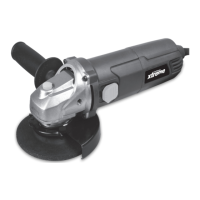HELPLINE NO 08448012949
3
ORIGINAL INSTRUCTIONS
dangerous and must be repaired.
c) Disconnect the plug from the power source
and/or the battery pack from the power tool
before making any adjustments, changing
accessories, or storing power tools. Such
preventive safety measures reduce the risk of
starting the power tool accidentally.
d) Store idle power tools out of the reach
of children and do not allow persons
unfamiliar with the power tool or these
instructions to operate the power tool.
Power tools are dangerous in the hands of
untrained users.
e) Maintain power tools. Check for
misalignment or binding of moving parts,
breakage of parts and any other condition
that may affect the power tool’s operation.
If damaged, have the power tool repaired
before use. Many accidents are caused by
poorly maintained power tools.
f) Keep cutting tools sharp and clean.
Properly maintained cutting tools with sharp
cutting edges are less likely to bind and are
easier to control.
g) Use the power tool, accessories and
tool bits etc. in accordance with these
instructions, taking into account the
working conditions and the work to
be performed. Use of the power tool for
operations different from those intended could
result in a hazardous situation.
5) SERVICE
a) Have your power tool serviced by a
qualied repair person using only identical
replacement parts. This will ensure that the
safety of the power tool is maintained.
SAFETY INSTRUCTIONS FOR
ALL OPERATIONS
Safety Warnings Common for Grinding,
Sanding, Polishing or Abrasive Cutting-Off
Operations:
a) This power tool is intended to function as
a grinder, sander, polisher or cut-off tool.
Read all safety warnings, instructions,
illustrations and specications provided
with this power tool. Failure to follow all
instructions listed below may result in electric
shock, re and/or serious injury.
b) Operations such as wire brushing is not
recommended to be performed with this
power tool. Operations for which the power
tool was not designed may create a hazard
and cause personal injury.
c) Do not use accessories which are not
specically designed and recommended
by the tool manufacturer. Just because the
accessory can be attached to your power tool,
it does not assure safe operation.
d) The rated speed of the accessory must
be at least equal to the maximum speed
marked on the power tool. Accessories
running faster than their rated speed can
break and y apart.
e) The outside diameter and the thickness
of your accessory must be within the
capacity rating of your power tool.
Incorrectly sized accessories cannot be
adequately guarded or controlled.
f) The arbour size of wheels, anges,
backing pads or any other accessory must
properly t the spindle of the power tool.
Accessories with arbour holes that do not
match the mounting hardware of the power
tool will run out of balance, vibrate excessively
and may cause loss of control.
g) Do not use a damaged accessory. Before
each use inspect the accessory such as
abrasive wheels for chips and cracks,
backing pad for cracks, tear or excess
wear. If power tool or accessory is
dropped, inspect for damage or install an
undamaged accessory. After inspecting
and installing an accessory, position
yourself and bystanders away from the
plane of the rotating accessory and run
the power tool at maximum no-load speed
for one minute. Damaged accessories will
normally break apart during this test time.
h) Wear personal protective equipment.
Depending on application, use face
shield, safety goggles or safety glasses.
As appropriate, wear dust mask, hearing
protectors, gloves and workshop apron
capable of stopping small abrasive or
workpiece fragments. The eye protection
must be capable of stopping ying debris
generated by various operations . The
dust mask or respirator must be capable of
ltrating particles generated by your operation.
Prolonged exposure to high intensity noise

